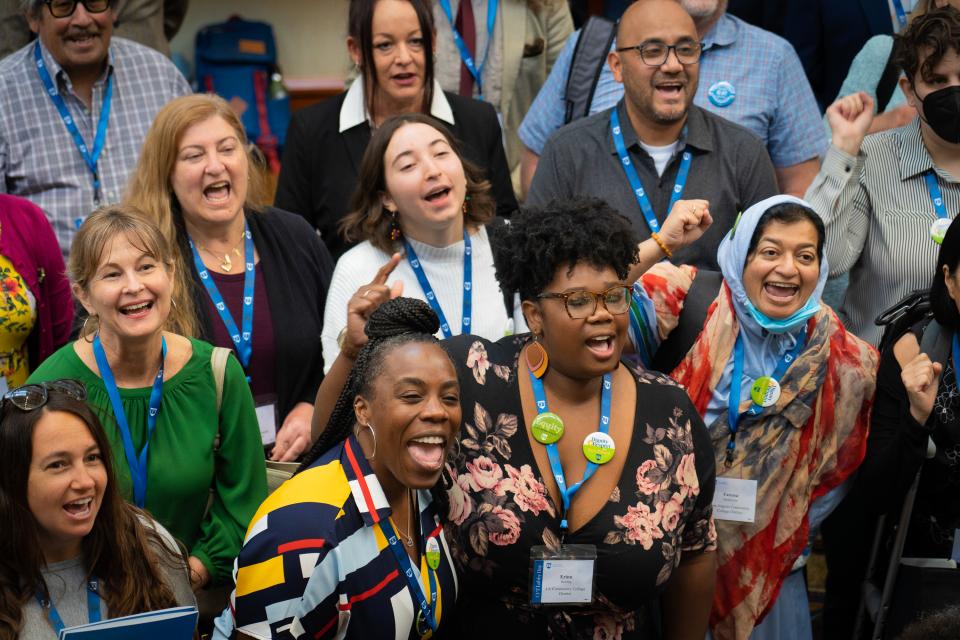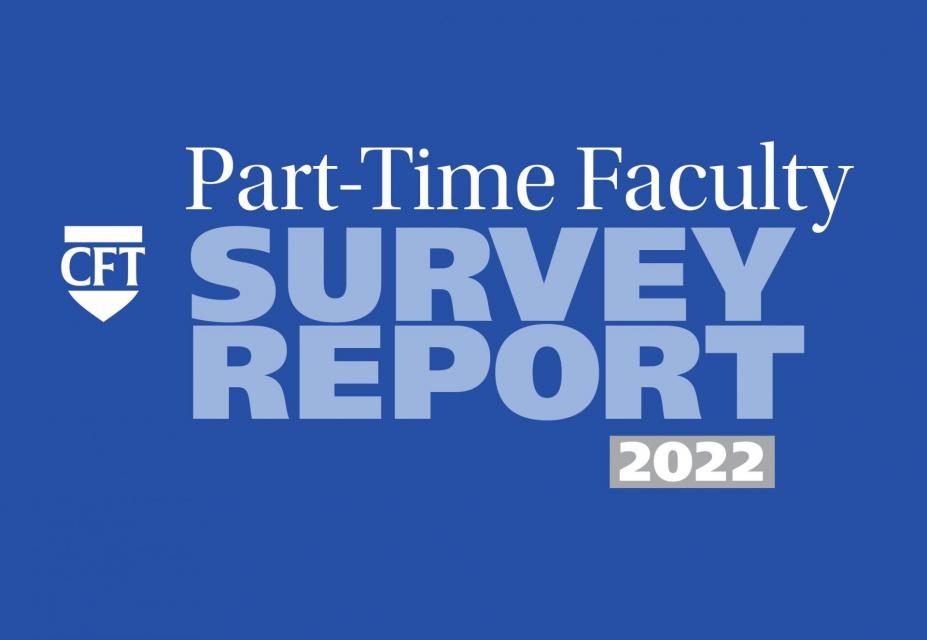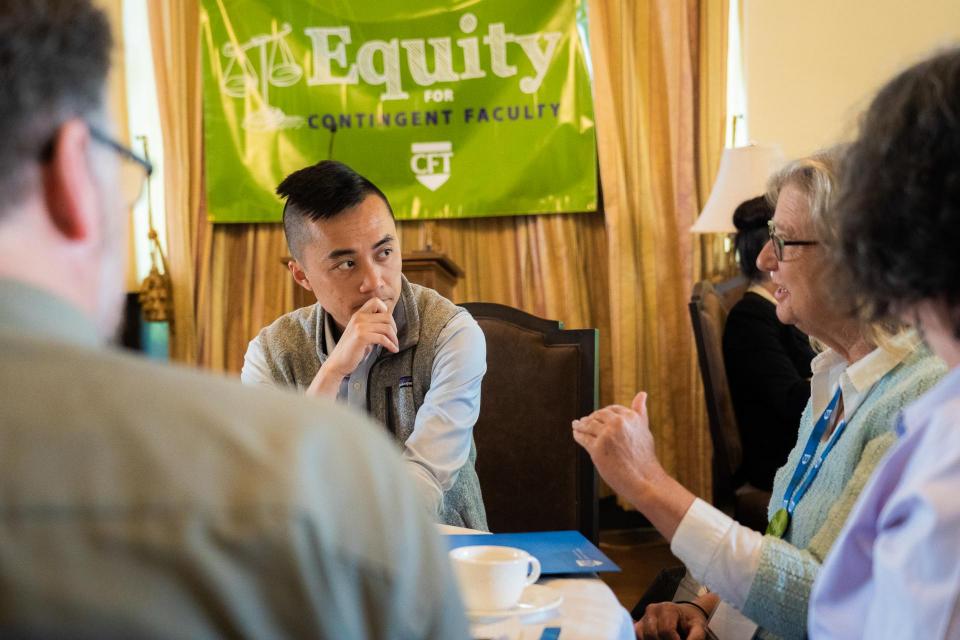A crowd of more than 100 members strong — some seasoned part-timers with decades of experience, others new adjuncts for which this was their first union event — were engaged as the CFT Part-Time Faculty Conference opened to roars and cheers with its theme of “Equity for Contingent Faculty.” The feeling one had as a part-timer was best summed up by Lin Chan, co-chair of the CFT Part-Time Faculty Committee, “You’re not one person…you’re one of thousands.”
From the very outset, the Sacramento conference reflected a pent-up enthusiasm stirred by the long isolation of COVID, but even more so by an event sorely awaited by long-time CFT part-time activists.
As part of a broader long-term CFT vision, and more than two years in the making, the Part-Time Faculty Conference appropriately opened on May Day, with a celebration of part-time labor togetherness, but quickly moved to a discussion of what equity meant to attendees, who joined in teams from their local unions and with activists from a mix of local unions. The answers were varied but all spoke of a need for part-timer social justice, from calls for pay parity and access to healthcare, to conversion of part-time jobs to full-time ones, and more racial gender justice so that faculty from minoritized communities can have access to full-time jobs.
Additionally, CFT released the results of our groundbreaking survey of part-time faculty, which calls out, often in agonizing detail, the healthcare crisis among contingent faculty, but yet contains information to arm members with more data than ever to be effective advocates.
Beyond the celebration, the conference had another goal — to get part-timers to “step outside our comfort zones and work together” — said Jessica Saint Paul from the Los Angeles College Faculty Guild.
Within 90 minutes of the start of the conference, part-time activists and full-time allies went to workshops focused on part-time organizing, communications, and legislative priorities, which was the most immediate driving force of the conference, and with good reason. CFT’s collective legislative efforts have put $200 million in ongoing healthcare funding within the grasp of part-timers, moved a bill proposing effectively equal pay for equal work for part-time faculty (AB 1752), along with a reboot of a bill to raise the per district teaching cap for part-time faculty from 67% to 85% (AB 1856).
With a consensus awareness that these legislative priorities cannot be moved without concerted action, John Govsky, co-chair of the CFT Part-Time Faculty Committee got into the “nitty-gritty” of campaign organizing. This led to discussions of one-on-one organizing and building worksite leaders within the Los Angeles College Faulty Guild, to getting students to connect with faculty for larger wins in the labor movement at Cerritos College.
After the first set of workshops, activists were brought together again to hear a panel discussion of AFT organizing successes. Jaime Rodriguez, president of AFT-Oregon spoke of their 13-year struggle to win healthcare for part-time faculty, resulting in the passage of SB 551 which allows part-time faculty working at least 50% of a cumulative full-time load across multiple Oregon institutions of higher education, to be eligible for insurance with 90% paid by the employee’s home institution and 10% by the employee.
Despite the long fight, AFT-Oregon persevered by engaging in the constant educating of changing state legislators on part-time issues, as well as seeking out legislators who had either been part-time instructors, or who had family members who had been. In his presentation, Rodriguez stressed the importance of getting legislators to hear part-timer stories, and to see the fight for affordable healthcare as one that affects not just part-time teachers, or even public employees, but an increasingly “part-timed” workplace in general.
Another panelist who received an enthusiastic reception was Mia McIver, president of University Council-AFT, with her story of UC-AFT’s three-year organizing campaign, resulting in 1,000 new members, and helping to build power for a contract campaign which won UC-AFT lecturers 30% in salary increases over four years, significant improvements in rehire rights, and what McIver proudly asserts is “the best contract for contingents in the nation.”
Afterward, conference attendees returned to another round of workshops dealing with healthcare bargaining tools, strategies, and messaging. If the governor’s proposed healthcare funding proposal becomes a reality, the next struggle will likely happen at the bargaining table as local bargaining units will have to get management to access the available funds to either create new healthcare programs, or improve existing ones. After the workshop session, local unions broke into strategy teams to identify goals and basic strategies for their upcoming contract campaigns.
As a component of the legislative priorities workshop, attention was given to messaging and how to speak to legislators, board members, policymakers, and even students. This mainly meant speaking, not in the manner of rallying an angry mob, but by telling powerful stories thoughtfully shaped around a specific ask. “We must define ourselves or they (management) will define us,” said the CFT staff trainer. This message was clearly not lost upon Will Dalyrmple of the Palomar Faculty Federation who sees the framing of a narrative as a way to “attach part-time work to other civil rights issues.”
The evening closed with a rousing speech by CFT President Jeff Freitas, who decried the poor wages and working conditions of adjuncts, while speaking to CFT’s larger goal of bringing an end to the inequity of the “two-tier” faculty system in higher education, and of the need for more secure full-time academic positions.
Since 2020 and even before, Freitas and CFT leaders have specifically made advocating for faculty equity in pay, benefits, and working conditions a key priority and the union has helped bring attention to the disparity between part-time faculty in the community colleges and contract faculty at UC as compared to full-time faculty. It has meant not simply the creation of the Part-Time Faculty Conference itself, but the hiring of a part-time faculty organizer dedicated to building organizing capacity among local unions.
Underscoring this commitment, Freitas vowed “We will continue to oppose the systemic over-reliance on part-time employment to educate our students.”
Be a part of our Part-Time Faculty Campaign!
The next morning saw a crowd of enthused and prepared part-time and full-time faculty activists, along with a contingent of CTA members and leaders, merge in a joint show of force to lobby state legislators. The room was full with some standing as final preparations and role plays took place before the attendees were arranged into groups and sent off to the nearby Sutter Club and legislative offices to meet with legislators and their staff to discuss the $200 million healthcare proposal for part-timers, as well as the pay parity and part-time teaching cap bills.
By the second day’s end, it was clear by their active and positive engagement with legislators and aides, that all who participated in the inaugural CFT Part-Time Faculty Conference had found an inner power they can take back to their local unions and grow.
— By Geoff Johnson, assigning editor of Part-Timer, member of the CFT Part-Time Faculty Committee and the AFT Guild, San Diego and Grossmont-Cuyamaca Community Colleges
























